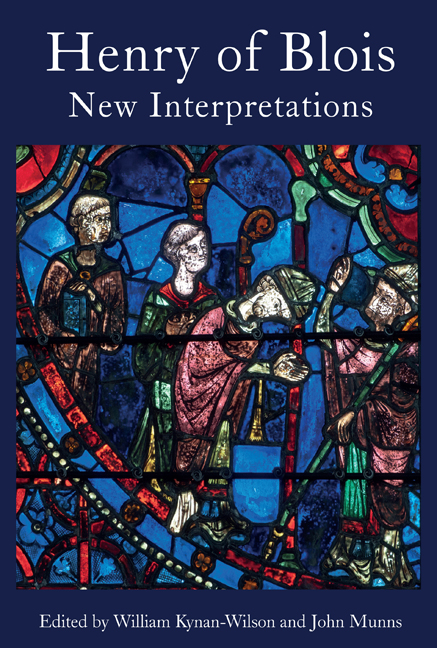Book contents
- Frontmatter
- Dedication
- Contents
- List of Illustrations
- List of Contributors
- Acknowledgements
- List of Abbreviations
- Genealogical Table: The Family Connections of Henry of Blois
- Introduction: Approaches to Henry of Blois
- 1 Causa Dei Et Ecclesie Cluniacensis: Henry of Blois and Cluny
- 2 Henry of Blois and His Legation in England
- 3 The Episcopal Colleagues of Henry of Blois
- 4 The Architectural Heritage of Bishop Henry of Blois at Winchester Cathedral
- 5 Wolvesey: Henry of Blois’ Domus Quasi palatium in Winchester
- 6 Bishop Henry’s Bible
- 7 Henry of Blois and the Construction of Roman Identity
- 8 Henry of Blois: Between Patronage and Representation in the Long Twelfth Century
- 9 The Last Days of Henry of Blois
- Timeline
- Bibliography
- Index
- Plate Section
9 - The Last Days of Henry of Blois
Published online by Cambridge University Press: 09 February 2021
- Frontmatter
- Dedication
- Contents
- List of Illustrations
- List of Contributors
- Acknowledgements
- List of Abbreviations
- Genealogical Table: The Family Connections of Henry of Blois
- Introduction: Approaches to Henry of Blois
- 1 Causa Dei Et Ecclesie Cluniacensis: Henry of Blois and Cluny
- 2 Henry of Blois and His Legation in England
- 3 The Episcopal Colleagues of Henry of Blois
- 4 The Architectural Heritage of Bishop Henry of Blois at Winchester Cathedral
- 5 Wolvesey: Henry of Blois’ Domus Quasi palatium in Winchester
- 6 Bishop Henry’s Bible
- 7 Henry of Blois and the Construction of Roman Identity
- 8 Henry of Blois: Between Patronage and Representation in the Long Twelfth Century
- 9 The Last Days of Henry of Blois
- Timeline
- Bibliography
- Index
- Plate Section
Summary
In 1922, the English Historical Review carried a very brief note from H. E. Salter on the last days of Henry of Blois. It was prompted by the recent publication of a dated charter of Henry II, from the register of Bishop John de Pontissara, which had been issued in favour of the prior and monks of St Swithun’s, Winchester, on 6 August 1171. This was just two or three days before Bishop Henry died. A former scholar of Winchester College, and England's leading authority on the charters of Henry II, Salter will have felt himself on home ground. He made the sound diplomatic point that ‘it is likely enough that the original grant was undated, and that when the monks entered it in their cartulary, they added the date’. It may not have been all that they added, as we shall see. Salter went on to discuss a further charter, from the same register, issued by the bishop himself, which bore the date 6 January 1171. To this charter also, we will need to return. But we should be able to dismiss immediately Salter's further suggestion, based on an over-literal reading of the vacancy account after Henry's death, that the see of Winchester had been vacant since 3 July 1171. ‘The assumption is that the bishop, like one of his predecessors, entered religion in his last illness and so ceased to be bishop.’ He arrived at this conclusion by dividing the figure in the account for the part year to Michaelmas 1171 into that for the full year to Michaelmas 1172, which came to 89/365. The compositor dutifully made a special font for this fraction. But the calculation, based on the assumption that the revenues of the bishopric came in at an even rate day after day, is misguided and the resultant date entirely spurious. It is interesting to be told that Salter had a passion for statistics, but this is hardly an excuse for his forgetting about Quarter Days. Henry of Blois had ‘entered religion’ over sixty years before his death.
- Type
- Chapter
- Information
- Henry of BloisNew Interpretations, pp. 232 - 252Publisher: Boydell & BrewerPrint publication year: 2021



